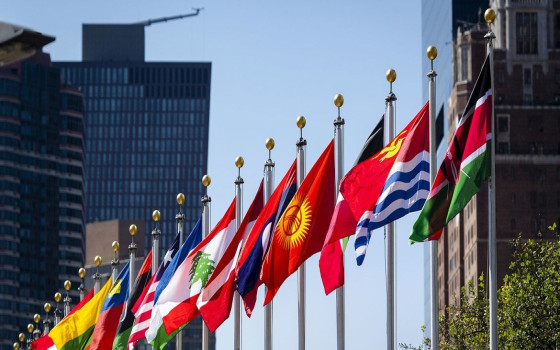
Holding permanent member states accountable for using the right of veto is a welcome innovation, according to what was stated in the speech of the new president of the United Nations General Assembly during the opening of the 78th session.

- Europe and Arabs
- Wednesday , 6 September 2023 13:20 PM GMT
New York: Europe and the Arabs
The President of the 78th session of the United Nations General Assembly said that he has identified four key priorities to ensure that this new session addresses global challenges in a meaningful way. According to what was reported in the daily news bulletin of the United Nations, of which we received a copy at dawn on Wednesday, and it also included an indication that those priorities, as set by the new President of the General Assembly, Dennis Francis, in his speech at the opening of the 78th session, are peace, prosperity, progress and sustainability.
Francis said that the interrelated challenges of climate, conflict and poverty make peace more difficult, stressing that the General Assembly "has a special responsibility to ensure that our efforts are based on a strong multilateral system" that derives its strength and legitimacy from inclusiveness and opportunities aimed at enhancing participation in the formulation of decisions.
The new President of the General Assembly praised the initiative put forward within the General Assembly related to holding the permanent members of the Security Council accountable for using the veto power, describing it as a "welcome innovation," noting that it represented an important step towards greater transparency and accountability with regard to the implementation of The right of veto, which must be interpreted within the scope of system-wide reform of the United Nations.
Financing and technology promotion
Regarding the priority of prosperity, Francis stressed the importance of finding tailored solutions to the challenges faced by countries in conflict and post-conflict situations.
"The General Assembly must throw its weight behind strengthening financing, technology, debt sustainability and capacity-building in places where development is short and where assistance is most needed," he said.
He urged Member States - in this regard - to follow up on the implementation of the Addis Ababa Action Plan, and to seize other major opportunities to increase investment and expand financing for development.
He also called for accelerating the transition to clean energy and enhancing support for adaptation by making climate finance more available, accessible and affordable.
"We can no longer tolerate unfair financial systems that keep countries trapped in vicious circles of debt and deprivation," Francis said.
Bringing development goals to life
In terms of progress, the President of the 78th session of the General Assembly stressed that there is a complete set of tools that contain all the elements required to promote tremendous progress towards achieving the development goals, "but we have not yet used these tools to their fullest potential."
He stressed that the Sustainable Development Goals Summit that will be held this month will be a crucial opportunity to rectify this matter, and breathe new life into the entire SDG process.
He added that the summit will allow for cooperation on three main health work areas, namely tuberculosis control, epidemic prevention, preparedness and response, and universal health coverage.
“The COVID-19 pandemic has taught us that global solidarity and international cooperation remain imperative if we are to collectively build resilient health systems and improve the global health architecture,” Francis said.
He also stressed the importance of closing gender gaps that have been “exacerbated for too long,” pledging to promote high-level participation and widespread awareness in events related to gender equality.
"A decisive moment"
Regarding the priority of sustainability, the President of the General Assembly said that it is important to build sustainable societies in harmony with each other and with nature because it is the only way to ensure the survival of humanity and the planet.
Francis stressed that what will be witnessed by the twenty-eighth Conference of the Parties (COP28) on climate is “a crucial moment for the world to come together and line up behind faster, more equitable and transformative climate action.”
He added that with the world population expected to reach 9.5 billion people by 2050, it is necessary to shift to a pattern of production, consumption and living that respects and balances all humans, organisms and ecosystems.
The President of the General Assembly said that he would commit, at this session, to engaging regional and other groups in cooperating collectively to breathe new life into the atmosphere of global cooperation and common commitments.
He added, "My ambition is for the General Assembly to address the range of challenges it faces in the most effective and comprehensive way possible."
"A moment to act"
In turn, the Secretary-General of the United Nations said at the opening of the 78th session of the General Assembly, “We face a world full of profound challenges and division that constitute a test for the United Nations.”
In his speech, which was read by his deputy Amina Mohammed, António Guterres stressed that the current moment is a moment to work for peace and human rights, save the sustainable development goals, and address the existential threat of climate change.
Guterres added, through his deputy, that this moment is the moment to work to create productive job opportunities and expand economic opportunities, especially for women and youth, and to ensure that rapid developments in technology such as artificial intelligence are a help, not a harm, to humanity.
Through his deputy, the Secretary-General called for formulating solutions that all people expect, and making progress towards a better, more peaceful and prosperous future, and a healthier planet.












No Comments Found